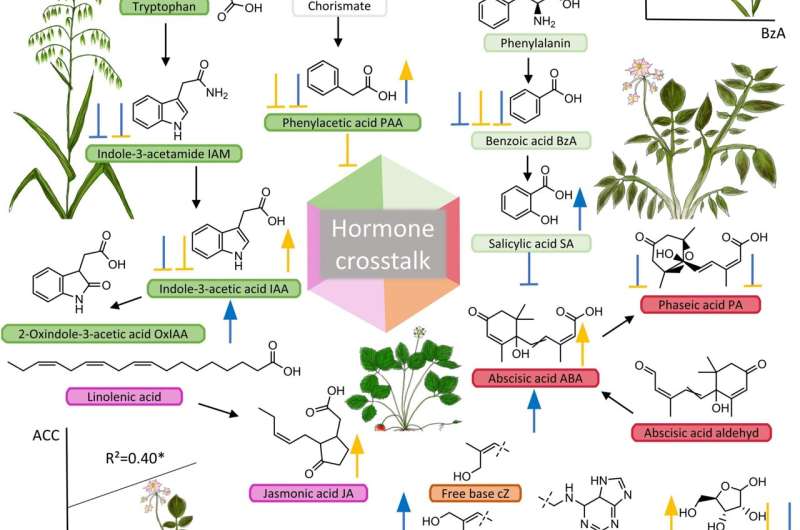Herbicide residues in soil affect hormone levels in crop plants

A new study finds that glyphosate residues in soil affect phytohormones in aboveground plant parts. Academy of Finland funded postdoctoral researcher Dr. Benjamin Fuchs investigates the effects of herbicide residues in soil on plant physiology and chemical ecology of plant-insect interactions.
Glyphosate-based herbicides are commonly used to kill weeds before crops are sown on agricultural field. It was assumed that glyphosate degrades quickly in the soil with none to negligible effects on the crop plants. However, herbicide residues are increasingly found in soils with agricultural history, globally, while at the same time soil health and plant resilience decreases.
The researchers conducted an experiment where they tested the effects of soil-borne glyphosate-based herbicides on plant hormone—phytohormone—levels of three important crop species, oat, potato and strawberry. Plant hormones are small molecules with essential signaling function in the plant, regulating in particular plant growth, flowering, senescence and responses to stressors such as drought, damage or pathogen infection. Furthermore, plant hormones are involved in fine-tuning the plant responses to feeding by herbivores, in particular the production of compounds, which help the plants to repel herbivores in order to minimize the damage.
Glyphosate inhibits a specific enzyme in the shikimate pathway, which is needed for the biosynthesis of essential aromatic amino acids in plants. The analyses of plant samples for a variety of phytohormones—in collaboration with researcher from the Czech Academy of Science—revealed that oat plants growing in soil, which contained minimal concentrations of glyphosate residues, showed decreased levels of phytohormones deriving from either one of those aromatic amino acids targeted by glyphosate. Surprisingly, this co-occurred with lower plant damage by herbivores, indicating an increase in plant resistance traits.
These results, published in Frontiers in Plant Science, demonstrate the hidden impact of ubiquitous agrochemical residues on phytohormones and plant-herbivore interactions. At the scale of agricultural fields, these effects may affect insect biodiversity pattern and affect insect biodiversity in agricultural environments, as highlighted by Dr. Fuchs and colleagues in an opinion article, published in Trends in Plant Science.
In contrast to oat, potato plants responded to herbicide residues in soil by elevating stress-related phytohormones and an increased plant growth, while strawberry plants were largely not responding to herbicide residues in soil, which shows how plant species-specific the responses to glyphosate residues in soil can be.
This study is a first indicator that herbicide residues in soil can interfere with biochemical plant processes, which determine the plants responses to their biotic and abiotic environment.
"At the scale of large farmlands, these changes can determine not only the plants relation to herbivores, but further might change the relation to beneficial insects such as predatory or pollinating insects, which is likely to affect essential ecosystem services," says Dr. Benjamin Fuchs.
More information: Benjamin Fuchs et al, A Glyphosate-Based Herbicide in Soil Differentially Affects Hormonal Homeostasis and Performance of Non-target Crop Plants, Frontiers in Plant Science (2022). DOI: 10.3389/fpls.2021.787958
Journal information: Trends in Plant Science , Frontiers in Plant Science
Provided by University of Turku


















